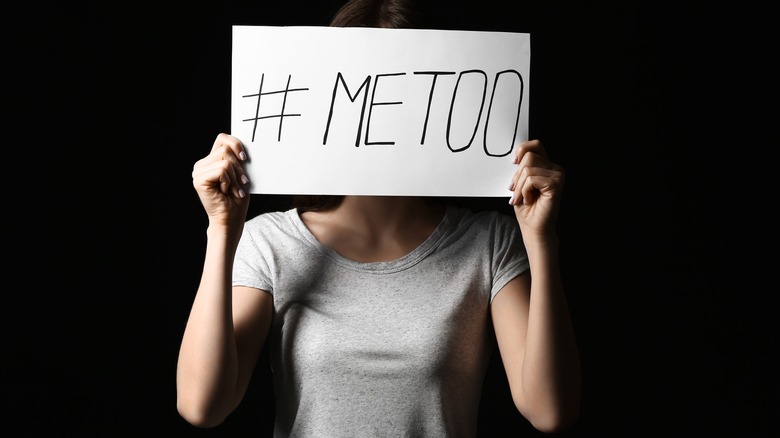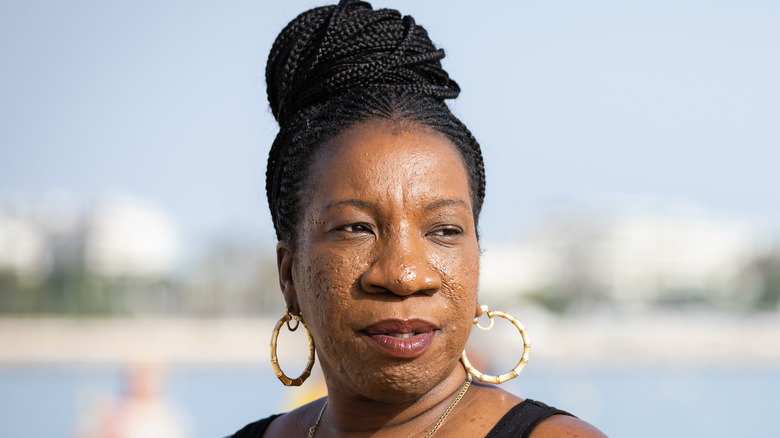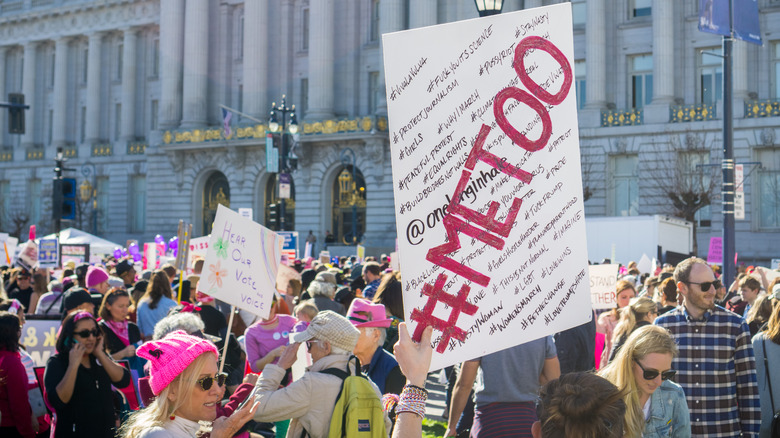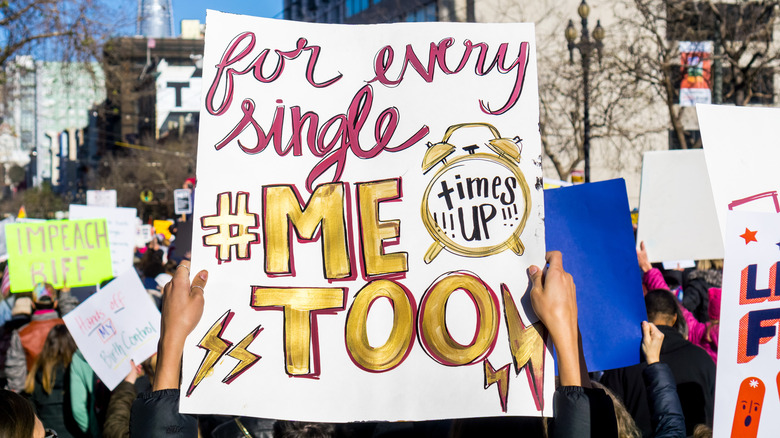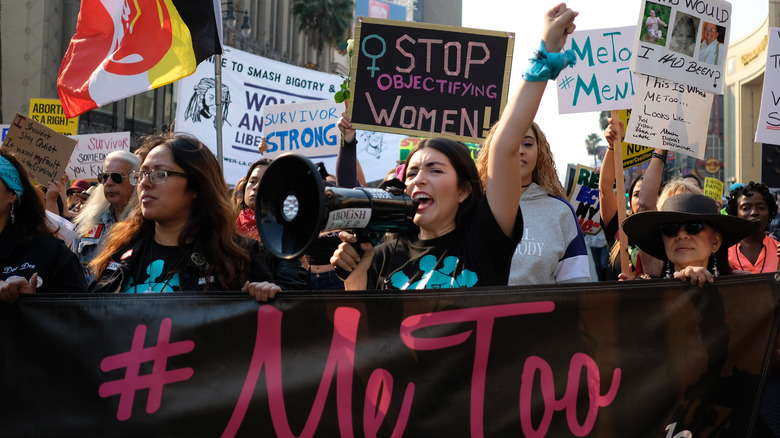How The Me Too Movement Emboldened Survivors To Seek Help Following Sexual Assaults
Brenna Twohy stood on stage at Marquee Theatre in Phoenix, Arizona in October 2014 and opened her poem with a dedication: "To the guy in the back of the room complaining about another rape poem." Up until 2017, the man of Twohy's poem reflected the general attitude towards stories about sexual assault. Budgets weren't big enough, details weren't salacious enough, or, as Slate writes: "male-dominated news outlets [...] treated such stories as impossible to confirm" that they felt should be handled in private, anyway.
Shame, fear — of not being believed, retribution, being judged — and guilt are major emotions survivors live with that already make it difficult to speak out about experiences, let alone report assaults to hospitals or law enforcement (via Jackson Health System). But according to Megan Lechner, the chief operating officer of the International Association of Forensic Nurses, "The more we, as a society, can normalize the response to sexual violence as a health care response, the more helpful we can be" (via CNN).
In the five years since the Me Too movement kicked off, studies are showing the culture around sexual assault — and the ability to talk about it —is starting to change. Not only are more survivors seeking medical care and reporting incidents, but as Slate points out, many people have been able to "reconsider past incidents, place them in the context of a broader struggle, and release the shame and self-blame that can accompany harassment endured in a vacuum."
If you or anyone you know has been a victim of sexual assault, help is available. Visit the Rape, Abuse & Incest National Network website or contact RAINN's National Helpline at 1-800-656-HOPE (4673).
The history of the Me Too Movement
Despite the fact the #MeToo hashtag didn't go viral until 2017, the Me Too movement itself actually started in 2006. It was meant to "support survivors of sexual violence, in particular black and brown girls," Tarana Burke, the founder of the movement, explained to Business Insider. What was shocking to her back then wasn't just how many young girls were sharing their experiences about sexual violence, but how many were disclosing experiences and had no idea it was sexual violence.
That was the original purpose of the movement and, according to Burke, is still the main focus of the movement. This isn't about getting people fired from their jobs; it's about giving space for survivor stories to be acknowledged and holding people accountable for their actions. A major watershed moment for the movement was when Chanel Miller outed herself as the "unconscious woman" Brock Turner was arrested for assaulting and the author of the victim impact statement originally published by Buzzfeed in 2016.
The Me Too movement is held responsible for the downfall of celebrities like Harvey Weinstein, Danny Masterson, Matt Lauer, and Kevin Spacey (via Variety). By 2019, Vox had tallied 262 "celebrities, politicians, CEOs" and other power players who have been accused of "sexual misconduct." However, in the jury selection for Weinstein's Los Angeles trial this week, doubts have been raised about the effectiveness of the movement, per Buzzfeed.
The problems with the Me Too movement
According to RAINN, there are an average of 463,634 victims of rape and sexual assault each year in the United States. They also report that out of every 1,000 assaults, only 28 out of the 1,000 will actually lead to a conviction. As Slate points out, this perpetuates the feeling that "at times, it could feel like we were left with thousands of appalling stories and not much to do about them."
For Slate, some of the major issues the movement has come down to the fact that the movement feels more reactive than proactive, building off of what stories are being covered in the media instead of being activist-led. This disorganization has led to the movement's inability to agree even on a basic definition of what sexual violence is and encompasses.
Plus, there have been many criticisms of the Me Too movement since its inception. Daphne Merkin shared in The New York Times that many women she spoke to felt that the movement had gone too far — a sentiment echoed in Caitlin Flanagan's article for The Atlantic on the 2018 allegations against Aziz Ansari. Emily Yoffe, too, writes for Reason that, "We are now in a time when a sexual encounter can be recast in a malevolent light" — an argument that rests firmly on the idea that people who disclose sexual violence are lying.
Why sexual survivors are speaking out in the wake of the Me Too movement
For many, though, the Me Too movement has empowered them to finally speak out. Surveys of employees and human resources professionals show that not only were boards of directors finally taking notice of sexual harassment in the workplace once #MeToo went viral, but companies have been taking steps to protect their employees following demands for better transparency about sexual harassment policies. This has created a less-hostile work environment and made space for employees to share their stories.
The fact that stories about sexual violence are being covered differently also helps. In conversation with Iris Carmon at the "Breaking News, Breaking Barriers: Women in American Journalism" conference, journalist Megan Twohey discussed how there's now an "established playbook" for how to handle sensitive reporting, including the best ways to approach and keep boundaries with sources. As The Washington Post points out, mistakes journalists have made in the past left "men positioned to avoid serious consequences."
With space being made for survivors to tell their stories, many did — adding their piece of sexual violence to the story quilt that became the #MeToo hashtag. When they did, they "revealed an unobstructed glimpse of the churning gears of sexual subjugation," Slate writes, adding that the anger and disillusionment many are feeling around the subject might not "always lead to world-changing social movements, but world-changing movements do not arise without them."
Other changes affected by the Me Too movement
Beyond the number of high-profile accusations that have been made, reported by Vox, a 2017 Equal Employment Opportunity Commission reported a "spike" in both sexual harassment charges that were filed and an increase in settlement payments handed by the agency, per Slate. To help support transparency, many states have now banned non-disclosure agreements on workplace discrimination and harassment and strengthened protections against workplace discrimination, including California, Maine, Illinois, New Jersey, New Mexico, New York, Oregon, and Washington.
Those weren't the only workplace protections, though. According to The Hollywood Reporter, "intimacy coordinators" have become common on Hollywood sets in projects that have sex scenes, helping with everything from choreography to costume. Activists have been pushing for an overall overhaul of Hollywood's culture, The New York Times reports, including working to make sure things like "casting couches" and meetings in hotel rooms instead of in public are part of the past.
Further, a study released this week by JAMA Network Open found that "emergency department visits for sexual assault were 15 times higher" in 2019 than they were in 2006, when the Me Too movement began. The study also found the majority of those seeking medical care after sexual assault are "young, female, and low-income." CNN explains that researchers at the University of Michigan believe that the number of people seeking treatment after a sexual assault is increasing mainly because of the awareness the Me Too movement has helped bring to the issue.
If you or anyone you know has been a victim of sexual assault, help is available. Visit the Rape, Abuse & Incest National Network website or contact RAINN's National Helpline at 1-800-656-HOPE (4673).
